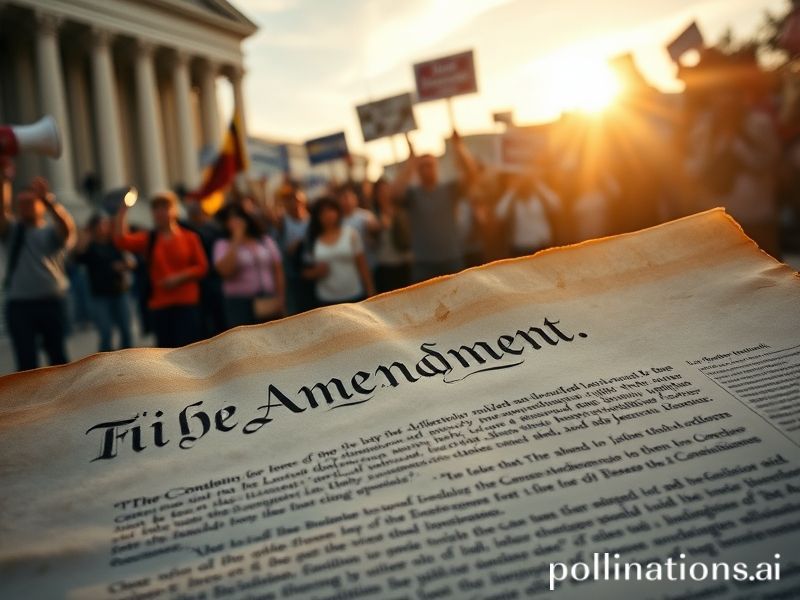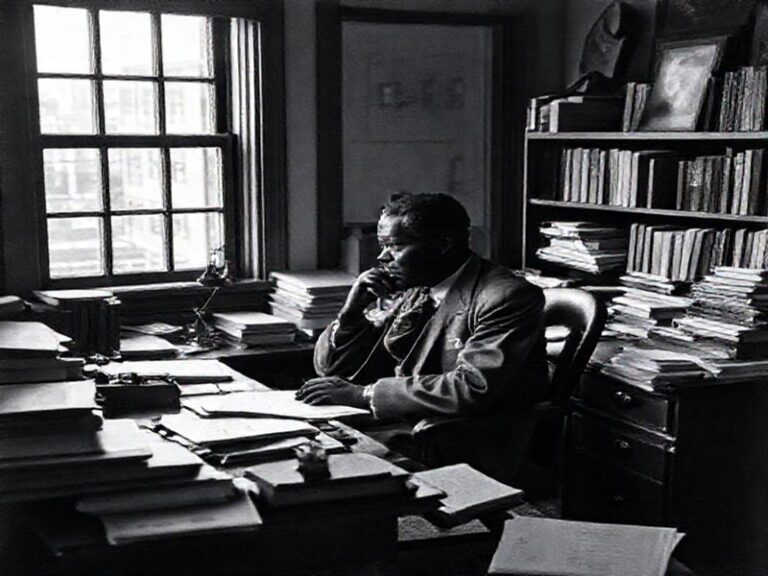First Amendment Goes Global: How the World Remixed America’s Favorite Free-Speech Mixtape
PARIS—While Washington was busy arguing over whether a TikTok ban violates the “freedom to doom-scroll,” the rest of the planet watched with the detached amusement of a bartender who’s seen the same brawl every Friday night. The American First Amendment—once the loudest kid on the ideological playground—now finds itself in a strange mid-life crisis: still flexing, still quoting itself, but increasingly aware that the other kids grew up, armed themselves with AI filters, and stopped speaking English.
From Singapore to São Paulo, governments have drafted their own constitutional karaoke versions of free speech. Some hit the high notes (Germany criminalizes Holocaust denial; nice tune, tight rhythm), others prefer death-metal growls (Myanmar’s military junta offers “expressive liberties” roughly equivalent to those enjoyed by a hooded falcon). Yet all of them, in their own charming way, cite the First Amendment the way hip chefs cite truffle oil—sparingly, when investors are watching, and never in the pantry.
Consider the European Union, where regulators recently finished polishing the Digital Services Act, a legislative Fabergé egg that promises to make Facebook “safer” by fining it into a small smoking crater. Brussels insists the rules protect democratic discourse; Silicon Valley insists they violate—wait for it—“fundamental human rights.” Watching American tech lobbyists lecture Europe on civil liberties is like watching a chainsaw salesman hand out leaflets on forest conservation: technically speech, morally bewildering.
Meanwhile, India’s government has pioneered the “First Amendment, but with cardio” approach. One week it bans a BBC documentary; the next it invites Twitter to a friendly “compliance” yoga retreat where the only pose is downward-facing server. When pressed, officials shrug and point out that Article 19(1)(a) of their own constitution guarantees free expression “subject to reasonable restrictions,” a phrase that translates roughly to “whatever keeps the group chat quiet.”
China, ever the avant-garde curator, has decided speech is performance art best confined to a single gallery—the state-approved kind where the paint never dries. Chinese netizens still whisper about “Constitutional Article 35,” the theoretical right to freedom of expression, in the same tone one might mention Bigfoot: fondly, futilely, and only after checking for hidden microphones. Yet even Beijing’s censors occasionally borrow American legal lingo. Nothing says “we’re not paranoid” like citing a Virginia court case while erasing Winnie-the-Pooh memes.
The irony thickens when you realize the First Amendment’s loudest global export isn’t liberty—it’s litigation. From Kenyan bloggers sued for “undermining authority” to Brazilian stand-ups fined for “offending political dignity,” attorneys now cite U.S. Supreme Court precedent the way Renaissance painters cited the Bible: selectively, flatteringly, and usually to justify a predetermined outcome. Somewhere in an air-conditioned Dubai office, a lawyer is billing $800 an hour to argue that a satirical tweet about a sheikh’s camel is “basically New York Times Co. v. Sullivan, Your Honor.”
What keeps diplomats awake at night is not the fear that America will abandon free speech—it’s the fear that nobody needs the original anymore. When Telegram channels in Tehran pump out protest videos faster than CNN can spell “Tehran,” the brand starts to dilute. When Nigerian #EndSARS activists route around Twitter bans via VPNs named after Star Wars characters, the concept becomes open-source. The First Amendment, once a neatly wrapped McDonald’s export, now resembles a food truck whose recipes have been stolen, remixed, and served with extra chili by every hungry populace on Earth.
And so we arrive at the final punchline: the Amendment that once swaggered across oceans in the form of jazz, jeans, and Hollywood endings now returns home jet-lagged, wearing counterfeit Nikes, and wondering why its own kids call it “cringe.” The rest of us will continue to borrow, distort, and occasionally torch the idea—because nothing says “freedom” quite like the universal right to misinterpret it.
In the end, the First Amendment may be the only American product still manufactured entirely by foreigners. It’s assembled in Taiwanese server farms, stress-tested in Cairo street protests, and shipped back to Washington as a souvenir T-shirt that reads, “I went to the marketplace of ideas and all I got was this lousy subpoena.”







